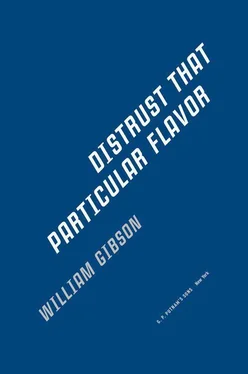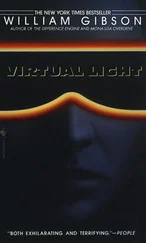My theory, such as it is, about Walter Becker and Donald Fagen, is that their Third, their Other, Mistah Steely Dan hisself, proved so problematic an entity for the both of them, so seductive and determined a swirl of ectoplasm, that they opted to stay the hell away from him for twenty years.
He continues on, of course, in the atemporal reaches of electronic popular culture, and I have often raised an eyebrow at hearing him sing, as I push a cart down some Safeway aisle, of the spiritual complexities induced by the admixture of Cuervo Gold, cocaine, and nineteen-year-old girls (in the hands of a man of, shall we say, a certain age). At which point I look around Frozen Foods and wonder: “Is anyone else hearing this?” Do the people who program these supermarket background tapes have any idea what this song is actually about? On this basis alone I have always maintained that Steely Dan’s music was, has been, and remains among the most genuinely subversive oeuvres in late-twentieth-century pop.
There’s a story about some hapless mook, down under the stadium there in Chicago where they did the hands-on prep for the first atomic bomb, who finds himself in the deeply unenviable position of having to shove together two halves of some grapefruit-sized mass of critically radioactive material. It ends, as they say, in tears, and that is what I’ve always imagined happened to Becker and Fagen; why they opted offshore and waited a couple of decades for the Geiger counters to stop clicking. Buried the two halves of that graphite core under their respective beds, maybe never to be reassembled.
Now whatever Mistah Dan might be — and I myself am inclined to think of him as a literary, or perhaps paraliterary, as much as a purely musical figure — Becker and Fagen are musos of the first water. Hence their respective solo output in the absence of Steely Dan. Which I’ve enjoyed, but in rather an oblique way, never quite able to stop glancing over my shoulder else that Third might loom suddenly into view, which he never did.
Now comes, as surely every Dan fan knows, Two Against Nature . The immediate and embarrassingly looming question being: Is He back? Have they resurrected His Bad Self?
Yes.
They have. The Stranger has signed in, his toe-cleavage ostrich loafers flaking red Maui clay on the studio broadloom.
Two Against Nature is actually a rather eerie experience in that regard, like being present for the arrival of a time machine. But not one from any particular past, or future; this music manages (as it always has) to transcend the duller registers of the cultural calendar. It’s as though it was composed in the time machine, in its own little pocket of temporality. I suspect that this is somehow the result of an encyclopedic sense of American music, an effortlessly graceful facility at collage and that patented Steely Dan studio wax, as though one were listening down through a hundred coats of hand-rubbed sonic carnauba, each glossy layer somehow highlighting a different aspect of the composition. But best ignore that, as I am anything but a musician. Suffice it to say: It sure sounds like Steely Dan to me, and the more so the longer I listen to it.
The DNA match is perfect. The real question, I think, is how close together have Becker and Fagen been willing to bring the two halves of the graphite core? Well, sometimes very close, it feels to me, and sometimes not so. My Dan counter starts to sizzle most seriously with “Jack of Speed” and “Cousin Dupree,” two very different pieces. “Jack of Speed” is an instant classic in the Dan Archive of Loping Psychedelic Naturalism, one of those luminously unfocused mug shots they’re so good at: Someone you once knew all too well, shuffled back, via the Dan magic, to stand in your doorway for a moment with Orphan Annie eyes. “Cousin Dupree” is Steely Dan at the very peak of droll American pop narrative, deeply comic and quietly merciless.
I’d say more about the other songs, but I’m starting to feel like a reviewer, which makes me intensely uncomfortable. I’m not a reviewer: I just want to say I like this record a lot, okay?
And I can only hope that Becker and Fagen decide that they can afford to let their Third out of the box a little more often, as there’s nobody else remotely like him, and we need him. I know I do.

One of the more peculiar, more semiconscious exercises I practiced, early in my fiction-writing career, consisted of reading record reviews in, say, Melody Maker, while pretending that I was actually reading a review of a new science fiction novel. I would later attempt to recall that novel, my sense of it from the review, as a species of writing-prompt.
Steely Dan’s recordings had never required that extra step, as I had from very first listening assumed them to be producing a remarkable species of narrative fiction. The popularity of their music, back when, had amazed me, as anything I liked that much wasn’t supposed to be that popular. I assumed that that was because most listeners scarcely brushed against the complexly strung razor-wire of the lyrics, dressed as they were in Kandy Apple jazzgloss. Becker and Fagen remain, most days, my favorite twentieth-century lyricists, to the frank dismay of friends in the Punk camp, who absolutely don’t get it. Never mind. We find it where we find it, inspirationwise.
Over a decade after I wrote this, it was my very great pleasure to get to know Mr. Becker somewhat, and to meet Mr. Fagen all too briefly. Never have my culture-heroes proven less disappointing.

The Baddest Dude on Earth

I ONCE WROTE A SCREENPLAY which featured a stoical, traditionalist Yakuza boss, exiled, in my near-future scenario, to the frozen, cockroach-ridden wastes of a dystopian Newark, New Jersey. Clenched like a fist around his grief at the loss of his daughter, he soldiers on, like a Roman legionary with a death wish the size of a Volkswagen on his shoulder. Meanwhile, his decadent, hotshot young understudy, a bio-tech dandy with a lethal thumb implant, watches for the earliest, easiest opportunity to kill him.
Where, I now wonder, did I find this character, this hard, immaculate man with his hidden inner wound? I had not, at that time, seen any Yakuza films, although I was aware of the genre by some species of pop-culture osmosis. And I had sensed that the roots of that genre would somehow be tangled in a rich mulch of American westerns and gangster films. I was somehow aware of the character as a re-importation. As a friend likes to say, there’s often something in a good translation that can’t quite be captured in the original. But where did my tough and tragic Yakuza boss come from?
He came, somehow, from the films of Takeshi Kitano, which I had not yet seen. He arrived as the crystalline, free-floating essence of an idea or stance. He owed everything to “Beat” Takeshi, a Japanese pop figure of such unstintingly multitalented eclecticism that we have no equivalent, nobody even close. (“They only want you to be the one thing,” Mick Jagger once told me, speaking of his own acting career.) Writer, producer, director, actor, television personality, comedian… But I knew nothing of that, as I wrote. Nor could I know that Takeshi, whose gravitas would one day tug at the film with the pull of a black hole, was said to be both a very great actor and the most famous man in Japan. Both of which, now I know, were and are true.
Читать дальше












